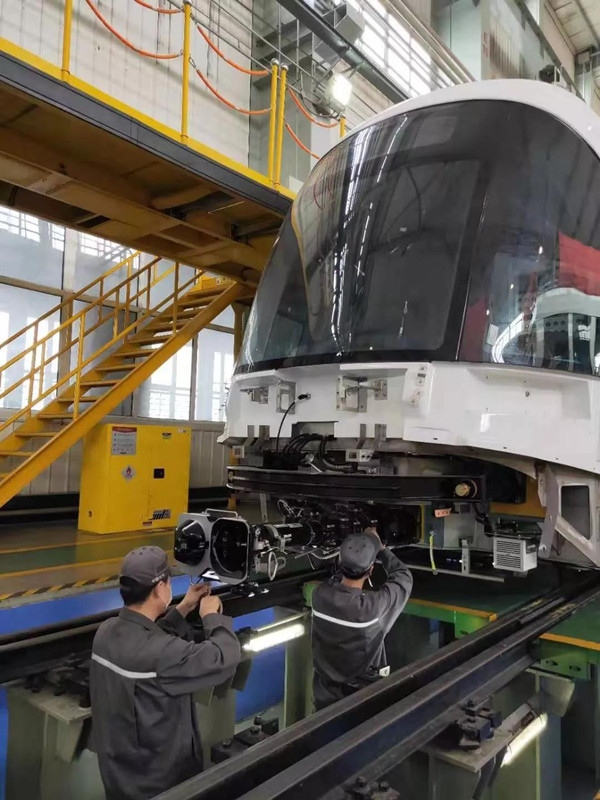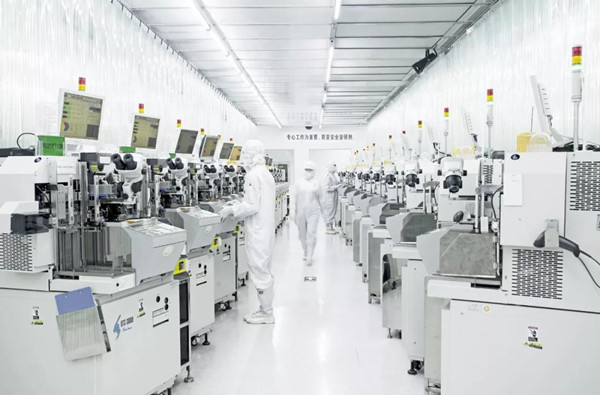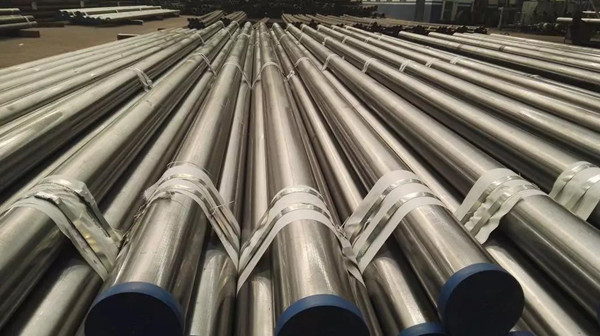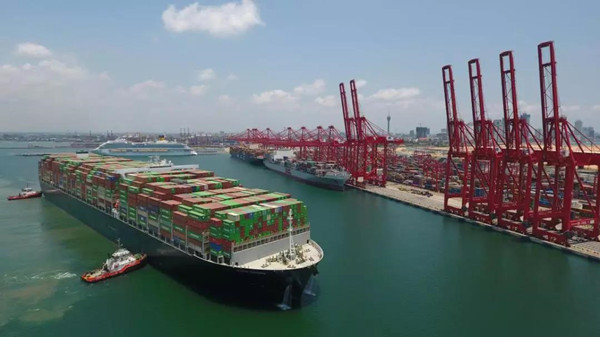Central SOEs Promote Resumption of Production, Stabilize Global Industrial Chain
As Chinese central SOEs play important roles on the global industrial chains, some of them are pulling out all stops to resume production to guarantee local supply, strengthen international energy cooperation and promote main overseas projects. The effect will be to stabilize international industrial chains and ensure smooth supply delivery.
Guaranteeing supplies to keep a stable international industrial chain
Some central SOEs are doing their best to guarantee the progress of overseas projects and have resumed production amid the outbreak of novel coronavirus pneumonia (NCP).
The first tunnel boring machine (TBM) used to build a Moscow metro line started operation on Feb 1.
Contracted by China Railway Construction Corporation Limited (CRCC), the project is to construct a 6.5-kilometer metro section in the southwestern part of the city that will connect to the Moscow Large Circle Line – a municipal traffic artery.
In addition, a tunnel boring machine (TBM) was packed at the Changsha First Industrial Park of China Railway Construction Heavy Industry Corporation Limited (CRCHI), a subsidiary of CRCC on Feb 10, ready for shipping to Turkey.
With an excavation diameter of 5.36 meters, the CECHI-developed 110-meter TBM meets requirements to export to Europe and will be used in a tunnel construction where it will dig through such solid rock as basalt and dacite.
A World Top 500 main rail transit equipment manufacturer, CRRC Corporation Limited (CRRC) offers trains, car components and relevant services to many countries. Its subsidiaries have already resumed production to guarantee projects' progress.
In addition to the six train export projects still under manufacture, which include the diesel multiple units to Abuja in Nigeria, trains for the Red and Orange lines in Boston in the United States, metro cars for the subway in Melbourne and the double-layer train for Sydney in Australia and the intercity trains in Israel, some train export projects to Russia, the United States and Argentina have already been delivered. Some other projects are close to completion.
CRRC Qishuyan Co., Ltd.'s two DF8B freight diesel locomotives exports to the Republic of Guinea have entered the general assembly stage and manufacturing of the 134 coal hopper cars for Australian GWA, contracted by CRRC Qiqihar Rolling Stock Co., Ltd., is close to completion, with shipment of the cars expected on Feb 20.

CRRC workers are working on a subway train. [Photo/sasac.gov.cn]
Several central SOEs related to iron and steel as well as the construction material industry also attained non-stop production in the past few weeks.
China Energy Engineering Group Zhejiang Thermal Power Construction Huaye Steel Structure Co., Ltd., a subsidiary of China Energy Engineering Group Co., Ltd. (Energy China Group), is now manufacturing a batch of steel works which will be the first of their kind for the construction of the Ostroleka Power Plant in Poland.
The steel is expected to be delivered on Feb 28.
China Railway Materials Group Corporation (CRM) delivered the third batch of steel rail weighing more than 8,000 tons to Laos for construction of the China-Laos Railway in early February.
Materials for the Budapest-Belgrade railway construction have also been sent to the construction site in Serbia since Feb 12.
China Petrochemical Corporation (Sinopec Group) positively explored alternative resources to guarantee oil products when faced with Libya's stoppage of crude oil exports.
To guarantee export of refined oil products, the company also dealt appropriately with export of general trade and processing of goods, and reduced sea transportation given that some ships were concerned about the epidemic in China.
Liquefied natural gas (LNG) supplies at home and abroad were also guaranteed.

CEC's subsidiary KAIFA is at full capacity to guarantee memory chip production. [Photo/sasac.gov.cn]
Electronic industries are also keeping to their positions.
A main supplier for many industry giants including Kingston, Seagate and Western Digital Corp, the subsidiary of China Electronic Corporation (CEC) – KAIFA – was at full capacity to guarantee memory chip production.
China National Chemical Engineering Group Corporation Ltd (CNCEC) kept production and coordinated the logistics to guarantee export amid the outbreak of NCP.
Fujian Tianchen Yaolong New Material Ltd., a subsidiary of CNCEC, had sold 38,212 tons of ammonium sulfate to such countries as India, Thailand, Lebanon, Kenya, Nigeria, Ghana, Turkey, Tanzania, Vietnam, Indonesia and Malaysia. The material is mainly used in fertilizer production and is also an ingredient in textiles, leather and medicine.
In addition to maintaining ordinary production and supply, some enterprises got new orders.
Potevio's subsidiary Eastcom recently received new orders for the smart printing equipment from its Indian clients who expect to obtain the devices in middle or late February.
Xinxing Cathay International Group Co., Ltd has signed an agreement on providing 87 tons of 310S austenitic chromium nickel stainless steel to a Brazil client, which is its most valuable order to date with a Latin American country.
Such material has strong oxidation resistance and can resist corrosion and high temperatures.

Stainless steel produced by Xinxing Cathay International Group Co., Ltd [Photo/sasac.gov.cn]
Overseas projects keep on schedule
Energy companies shoulder great responsibility to guarantee construction schedule.
China Huadian Corporation Ltd. (CHD) organized its employees to return separately to the construction sites to guarantee progress of the overseas projects.
Almost 900 Chinese builders of China Three Gorges Corporation (CTG) remained in position to contribute to construction of the Karot Hydropower Project, a project under the framework of the China-Pakistan Economic Corridor.
The plant will evolve into a reliable energy source and is expected to produce about 3.2 billion kWh of clean power annually when completed.
With about 59 percent of foreign employees, State Power Investment Corporation Limited (SPIC) never stopped operation even during Spring Festival.
By the end of 2019, the company had 71.17 billion yuan ($10.19 billion) of offshore capital and the total installed capacity of its operating power projects was 5.21 million kW, 65.1 percent of which was clean energy.
China General Technology, Dongfang Electric Corporation, China Communication Construction Company Ltd. and China Metallurgical Geology Bureau (CMGB) guaranteed construction and lowered the epidemic's negative impact through adjusting construction plans, recruiting more crews and communicating by video.
Subsidiaries of China National Building Material Group Co., Ltd. (CNBM) recently signed five new agreements overseas, three on construction and two on equipment supply. More than 110 overseas projects are also making on-schedule progress.
Sea-air-land joint transport to ensure smooth global logistics
Smooth logistics are the base of global trade. Central SOEs have ramped up efforts to guarantee global transport and promote international trade.
China Merchants Group (CMG) implemented several policies and realized improvement in port handling capacity.
In January, CMG had a port handling capacity of 10.22 million TEU (twenty-foot equivalent unit), equal to that of last year even in the midst of the NCP outbreak.
With the special mode of port-middle area-backyard which refers to development and operation of community, and industrial zones as well as construction and operation of the cruise industry, CMG's Djibouti International Free Trade Zone had eight more signed transnational clients in China, South Africa and India.
So far, 79 enterprises have signed contracts to settle in the zone and another 11 are still under negotiation.

CMG had a port handling capacity of 10.22 million TEU in January. [Photo/sasac.gov.cn]
China COSCO SHIPPING Corporation Limited (COSCO SHIPPING Group) is doing its best to balance domestic demand and supply, and at the same time to strengthen the transport capacity in regions such as Southwest Asia, South Asia, Latin America and Africa even as it develops third country markets.
International joint transport is a main method to guarantee logistics and the China-Europe freight trains and those operating between European and Asian countries have resumed transport.
Airlines are also on standby to support anti-epidemic material and common goods transport.
China National Aviation Holding Corporation Limited (Air China) arranged nearly 100,000 employees to serve Spring Festival travel and anti-virus transport. Among them, more than 1,300 stayed in their positions in Wuhan, Central China's Hubei Province, the city most affected by NCP.
The airline has undertaken 25 chartered flights to transport 205 tons of anti-virus materials since Jan 25. Nearly 2,700 medical workers were flown to the front line and more than 200 Chinese people were returned home from abroad.
Six hundred and forty-two tons of materials for virus prevention and control were also transported by ordinary flights of Air China.
China Eastern Air Holding Co. Ltd (China Eastern) transported 5,129 medical workers to Hubei Province and carried 339 Hubei residents home from Vietnam, Singapore and Indonesia with 50 chartered carriers from Jan 25 to Feb 11.
By Feb 11, the airline has undertaken 30,768 flights, including 5,443 international and 25,325 domestic ones.
China Eastern also promoted a green passage to guarantee transport of anti-epidemic materials and everyday goods.
Regular bonded truck service which refers to land transport between the departure place, transit terminal and destination has also been promoted by the airline since Feb 10 in such cities as Xi'an of Shaanxi Province and Hangzhou of Zhejiang Province as well as Beijing.
Irregular bonded truck service opened in Dalian in Liaoning Province, Jinan and Yantai in Shandong Province as well as Tianjin, which strongly supported enterprises' resumption of production.
China Southern Air Holding Company (China Southern) also allocated its transport capacity and aircraft resources to guarantee non-stop international flights.
The airline carried 1,449 international flights from Feb 1 to 11 and recently increased flights on Guangzhou-Nanyang, Guangzhou-Xi'an and Guangzhou-Taiyuan routes. Larger aircraft are also used to meet increasing transport demands.
So far, more than 80 percent of the subsidiaries of central SOEs have resumed production and are continuing to contribute to the world's capacity.
(Executive editor: Wang Ruoting)



